
Itracap 100mg Capsule
Manufacturer
Cappeline Pharmaceuticals Pvt Ltd
Salt Composition
Itraconazole (100mg)
Key Information
Short Description
Itracap 100mg Capsule is an antifungal medication used to treat infections of the mouth, throat, vagina, and other parts of the body including fingernails and toenails.
Dosage Form
Capsule
Introduction
Itracap 100mg Capsule should be taken in the dose and duration as prescribed by your doctor. It should be swallowed whole and can be taken with food. To get the most benefit, take this medicine at evenly spaced times and continue using it until your prescription is finished, even if your symptoms disappear after a few days. If you stop the treatment too early, the infection may return and if you miss doses you can increase your risk of infections that are resistant to further treatment. Tell your doctor if the infection does not get better or if it gets worse. The most common side effects of this medicine include nausea, dizziness, headache, vomiting, diarrhea, abdominal pain, constipation, and dyspepsia. You could ask your doctor about ways of preventing or reducing these effects. Get emergency medical help if you have signs of an allergic reaction like severe skin rash, tingling, difficulty breathing, swelling of your face, lips, tongue, or throat. Do not take it if you are pregnant or could become pregnant unless your doctor has told you to. Talk to your doctor before taking this medicine if you have a history of heart failure, a weak immune system (including HIV/AIDS), kidney problems, or liver problems such as yellow skin (jaundice). This medicine may not be suitable for you. If your course of treatment is for more than a month, your doctor may want to check your liver by testing your blood.
Directions for Use
Take this medicine in the dose and duration as advised by your doctor. Itracap 100mg Capsule is to be taken with food.
Safety Information
Side Effects
Nausea Dizziness Headache Vomiting Diarrhea Abdominal pain Constipation Dyspepsia
Alcohol Warning
Caution is advised when consuming alcohol with Itracap 100mg Capsule. Please consult your doctor.
Breastfeeding Warning
Itracap 100mg Capsule is probably unsafe to use during breastfeeding. Limited human data suggests that the drug may pass into the breastmilk and harm the baby.
Pregnancy Warning
Itracap 100mg Capsule may be unsafe to use during pregnancy. Although there are limited studies in humans, animal studies have shown harmful effects on the developing baby. Your doctor will weigh the benefits and any potential risks before prescribing it to you. Please consult your doctor.
Interacting Medicines
Alfuzosin Amisulpride Aripiprazole Carbamazepine
How it works
Itracap 100mg Capsule is an antifungal medication. It kills fungi by destroying the fungal cell membrane. This treats your skin infection.
Quick Tips
Itracap 100mg Capsule helps treat fungal infections of mouth, skin, vagina, or any other parts of the body. Do not skip any doses and finish the full course of treatment even if you feel better. Take it with food, preferably at the same time every day. Use a reliable method of contraception to prevent pregnancy while taking this medicine. Do not take indigestion remedies (antacids) within 2 hours of taking Itracap 100mg Capsule. Your doctor may check your liver function before starting treatment and regularly thereafter. Inform your doctor if you notice yellowing of eyes or skin, dark urine, or stomach pain. Inform your doctor if you develop allergic reactions, nerve pain, or hearing loss.
Related Medicines
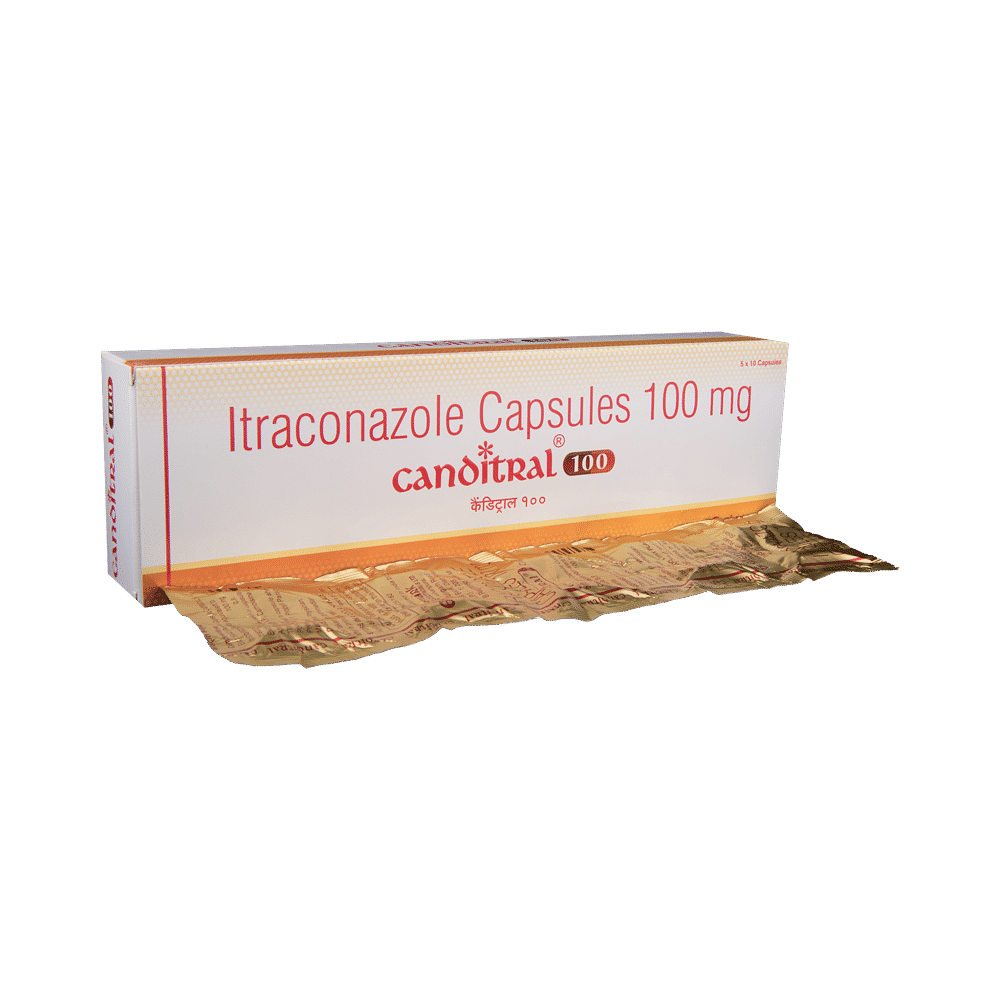
Canditral 100 Capsule
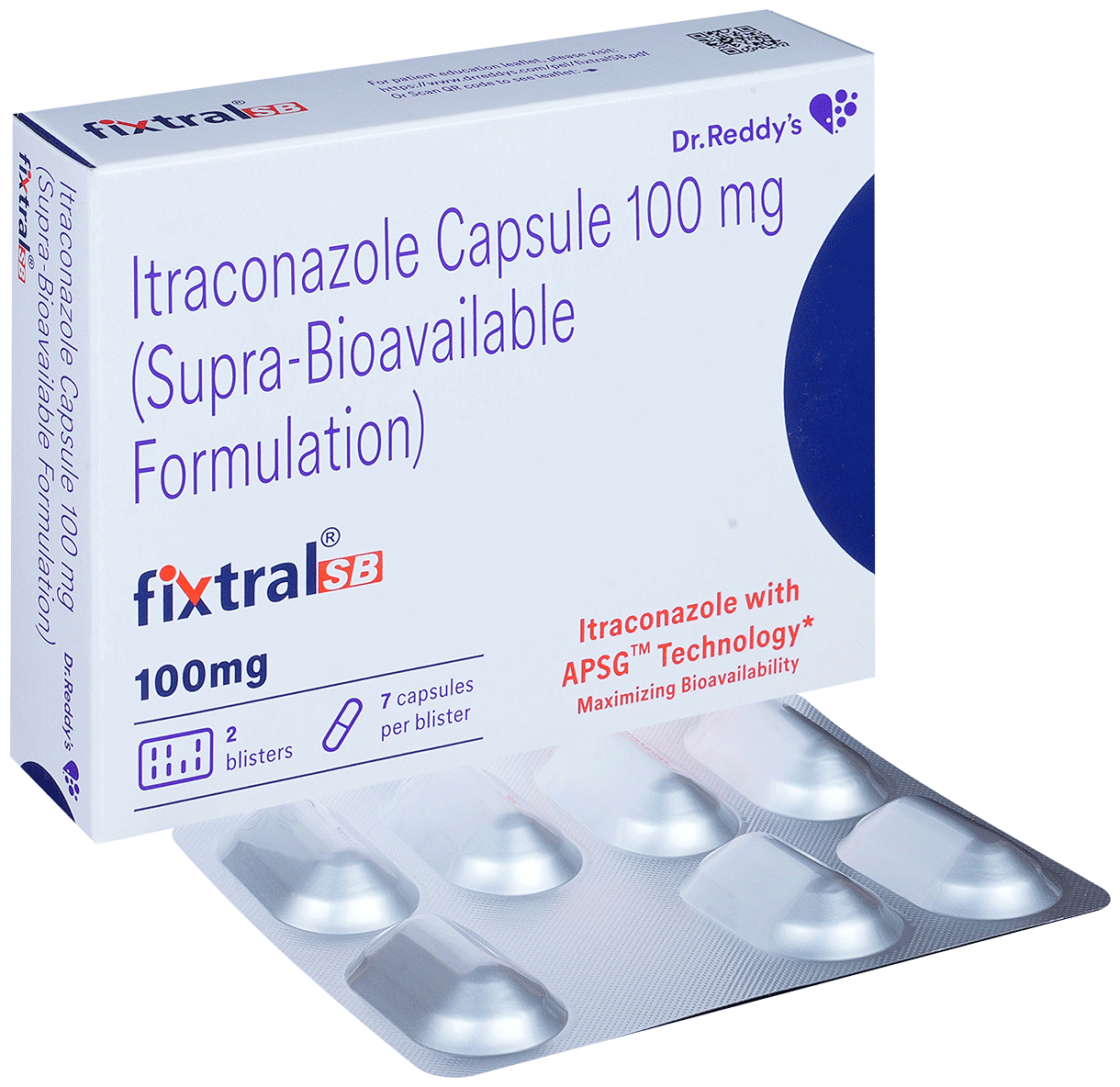
Fixtral SB 100mg Capsule

Alcross 100mg Capsule

Zole-IT 100 Capsule
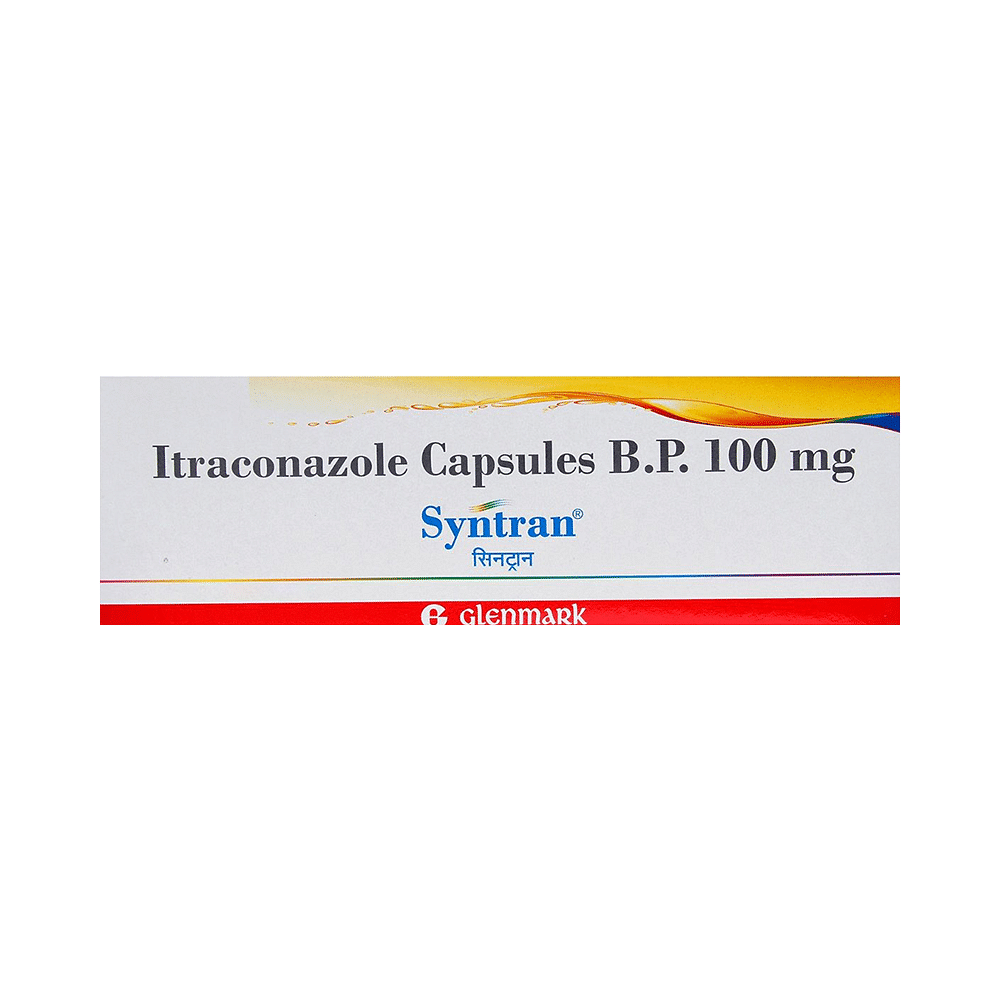
Syntran 100 Capsule

Nokver 100 Capsule
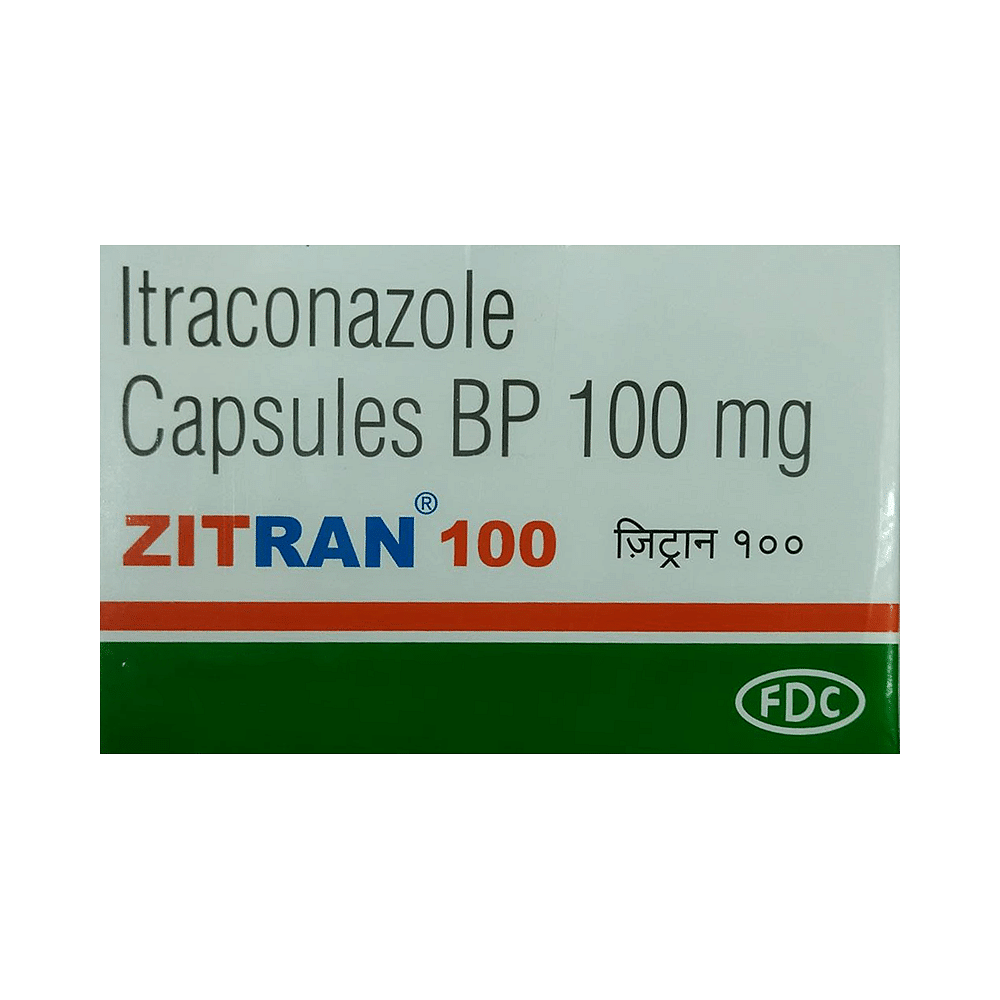
Zitran 100 Capsule

Itaspor SB Forte 100mg Capsule
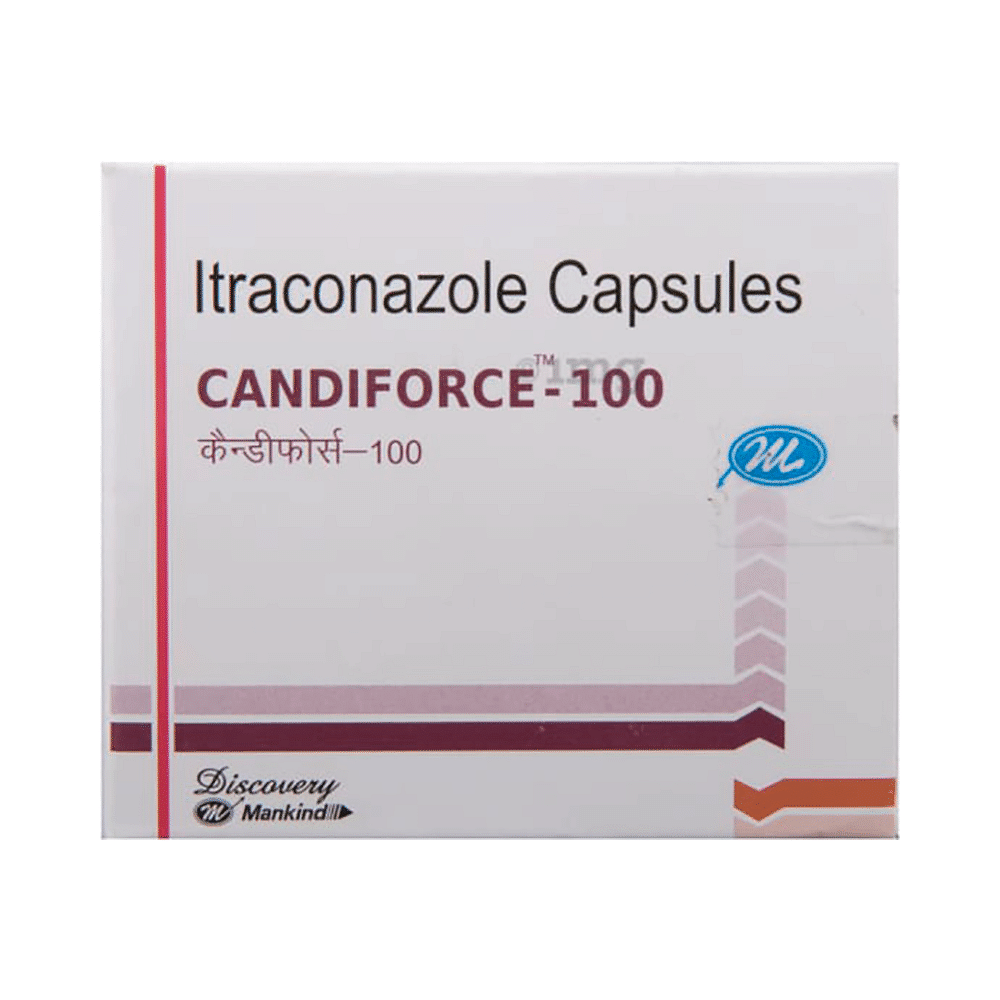
Candiforce-100 Capsule
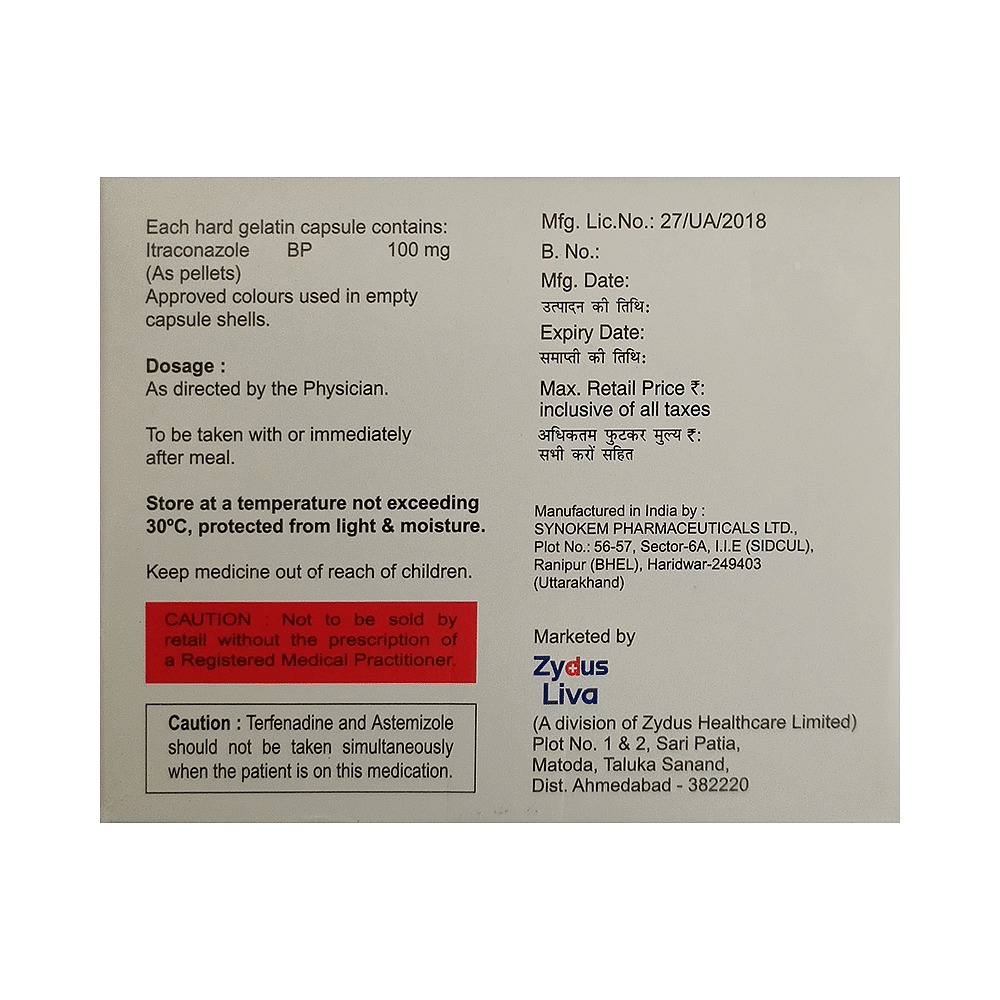
Mycoclear 100 Capsule
Frequently asked questions
What is Itracap 100mg Capsule used for?
Itracap 100mg Capsule is used to treat fungal infections caused by Trichophyton spp., Microsporum spp., and Epidermophyton floccosum. The infections can include ringworm, foot infection, or groin/buttock infection. It is also used to treat persistent nail fungus, candidiasis (yeast) in the vagina, mouth, or throat for patients with lower disease resistance. Itracap 100mg Capsule is also used for cryptococcal infection and infections caused by Histoplasma, aspergillus, and Blastomyces.
For how long do I need to take Itracap 100mg Capsule?
The dose duration of treatment depends on the type and site of infection, and your response to treatment. For example, if you are taking Itracap 100mg Capsule for athlete's foot (fungal skin infection), it might need to be taken for 30 days, while for a vaginal candidiasis, the dose may span from 1 day to 3 days depending on the dosage advised by your doctor.
I am taking Itracap 100mg Capsule for nail infection but there does not seem to be any improvement. Can I stop taking it?
No, you should not stop taking Itracap 100mg Capsule without completing the entire course because stopping early may not completely cure the fungal infection. The treatment usually takes about 6-9 months for nail lesions to disappear because after the medicine eliminates the fungus, new nail grows take several months. Don't worry if you don’t see immediate improvement.
Why has my doctor asked me to get blood tests done?
Your doctor is likely trying to monitor your liver function. Itracap 100mg Capsule can cause serious liver damage, so if you experience loss of appetite, nausea, vomiting, dark urine, or abdominal pain while taking Itracap 100mg Capsule, please tell your doctor immediately.
Can I take antacid and Itracap 100mg Capsule together?
Itracap 100mg Capsule can be utilized by the body if there is sufficient acid in the stomach. Medicines for stomach ulcers, heartburn, or indigestion neutralize the acid produced by the stomach. Therefore, take antacids or any such medicine approximately 2 hours after taking Itracap 100mg Capsule. If you are taking antacids (medicines that stop the production of stomach acid), take Itracap 100mg Capsules capsules with a drink of cola.
What is drug resistance? Is it possible to develop resistance to Itracap 100mg Capsule?
Drug resistance occurs when fungi modify themselves in the body, and the medicine no longer works. This can happen due to changes in fungal DNA, which can lead to a decrease in medication effectiveness. Resistance to Itracap 100mg Capsule has been reported for some Candida species ( krusei, glabrata, and tropicalis). If your doctor suspects resistance, you should not use it as it can cause more severe infections or complications.
I have been on alprazolam for quite some time. Is it okay if I start Itracap 100mg Capsule now?
Yes, you can take both Alprazolam and Itracap 100mg Capsule together, but keep a watch out for potential side effects of Alprazolam such as lightheadedness or drowsiness. If any side effects appear after taking Itracap 100mg Capsule, discuss them with your doctor, who might adjust the dose of Alprazolam.
My doctor prescribed Itracap 100mg Capsule to me but not to my friend who had a similar fungal infection because she was on dofetilide. Why is it so?
Your doctor did not prescribe Itracap 100mg Capsule to your friend because Itracap 100mg Capsule interferes with the working of dofetilide. This interference can cause disturbed electrical activity in the heart, which could be harmful to the patient.


